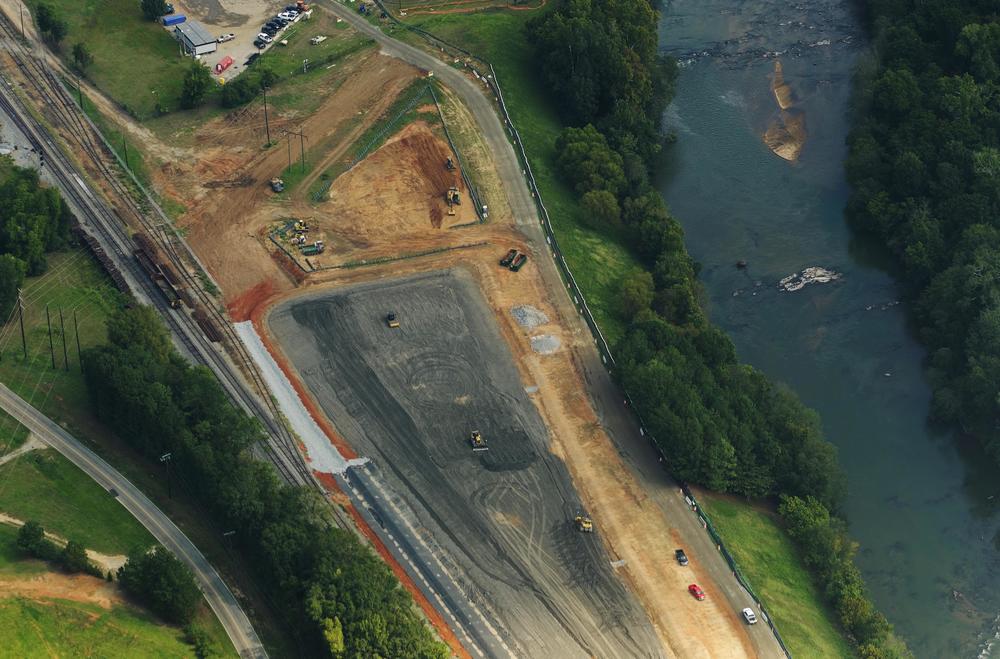
Caption
Unlined "legacy" coal ash landfills at Georgia Power's Plant Arkwright are seen being consolidated into a single lined landfill on the bank of the Ocmulgee River in September of 2023.
Credit: Grant Blankenship/GPB News

Unlined "legacy" coal ash landfills at Georgia Power's Plant Arkwright are seen being consolidated into a single lined landfill on the bank of the Ocmulgee River in September of 2023.
The Environmental Protection Agency has proposed a rollback of some rules around the management of the toxic material that is left after burning coal to generate electricity, so-called coal ash.
The announcement of the rule came only minutes after people from around the country, at the agency’s invitation, told the EPA about the dangers and their frustrations with living with coal ash threatening their drinking water.
The proposed EPA rule updates a section of comprehensive and final coal ash rules published in May of 2024.
The rollback would give utilities extra years to locate, document and monitor groundwater pollution from old and sometimes forgotten coal ash impoundments which may have been closed for decades.
These are sometimes called “legacy coal ash ponds" (or, in official documents, coal combustion residuals management units, or CCRMUs) to distinguish them from coal ash ponds in which closure plans began coming together after the EPA began wrestling with its coal ash rules in 2015, like at Georgia Power’s Plant Scherer in Monroe County, and where compliance with up-to-date rules is a matter of “fix as you go” as opposed to “go and do your work again” at the legacy ponds.
The extension is in line with recommendations made in a white paper published in June by the Cross-Cutting Issues Group, a national consortium of electricity utilities. In that paper, the group argues that the EPA acted outside the bounds of the law when it said older coal ash ponds are subject to environmental rules formulated after the impoundments were closed.
The high cancer rates among neighbors became folklore to residents of Juliette, Ga. They were accustomed to seeing their neighbors’ homes demolished, their wells filled with concrete, and a sign from Georgia Power put up on a padlocked property gate. At the heart of it all were unanswered questions about how any of it came to be and whether it had something to do with the water they had been drinking.
Andrea Goolsby, who lives near Plant Scherer, one of the nation’s largest coal-burning power plants, said she agreed to join the Zoom call alongside other people from around the country who are worried about coal ash, to make the EPA understand one thing:
“That people in these small communities are sick of them not doing their job, of allowing these companies to do whatever they want," Goolsby said.
Minutes after hearing that, the EPA published the new rule.
Goolsby, along with some of her neighbors in the Middle Georgia town of Juliette, Ga., has been active for years in trying to force Georgia Power to seal the massive Scherer ash pond away from groundwater. Many in Juliette suspect their illnesses and the deaths of their loved ones are connected to coal ash.
Goolsby voted for President Donald Trump in the last election. Most people in Juliette and Monroe County did, too.
“I vote the way that I vote: Republican, conservative,” she said. “But during this whole quest to get people access to clean drinking water and make a change, it's really made me question who I side with.”
The EPA rule change, if it is made final, may have little direct impact on Georgia. The state is one of a handful with the authority to manage coal ash on their own. Georgia’s Environmental Protection Division says it has not decided whether to adopt the new EPA rule.
But some see this rollback of coal ash rules as likely just the start of the unraveling of the larger framework for coal ash regulation.